Crime in China
The Real Deal: Xinjiang Anti-Drug Campaign Video Goes Viral
Some people suggest the actor in Xinjiang’s latest anti-drug video campaign deserves an Oscar for his drug dealer role.
Published
2 years agoon
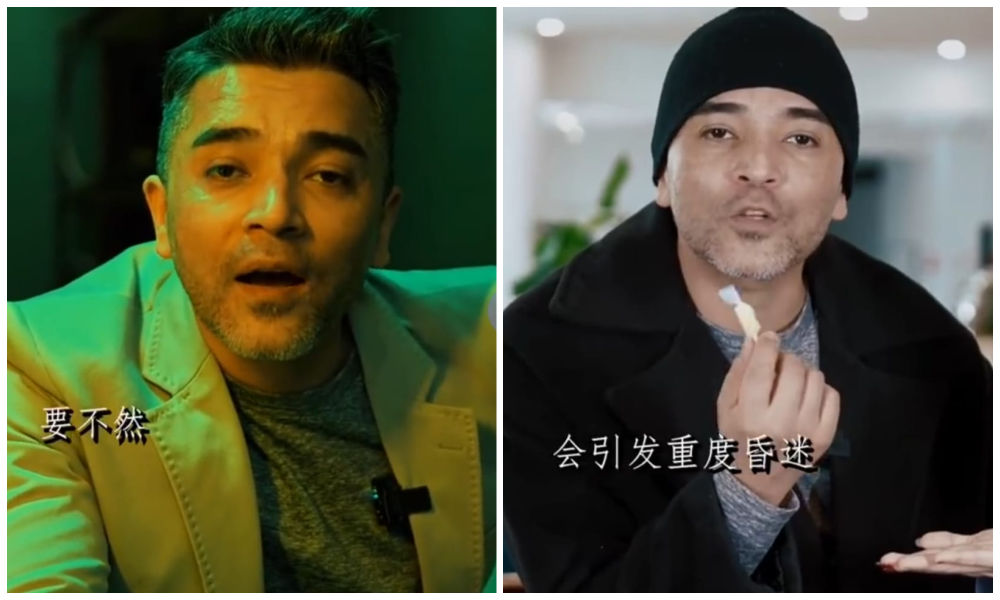
An anti-drug campaign released by Xinjiang authorities has become a trending topic on Chinese social media after different major Chinese official media outlets such as People’s Daily posted the video on their social channels.
One of the main reasons why the video has gone trending is not because of the strong anti-drug message it conveys, but due to the acting skills of the featured anti-drug ambassador. Many people say they would immediately believe he truly is a drug dealer.
Some people actually think he is so convincing as a drug dealer, that he is less convincing as an actual anti-drug ambassador.
“He’s a better actor than many actors we know,” some said, with others praising the ‘drug-dealer’ actor for having “such temperament, such aura.”
One hashtag related to the video, initiated by the Sichuan media account Sichan Guancha (@四川观察), is titled “Xinjiang Anti-Drug Ambassador Doesn’t Look Like [He’s] Acting” (#新疆禁毒形象大使不像演的#), and it received over 350 million clicks on Weibo on Thursday, becoming one of the top trending topics of the day.
In the video (link), we first see a man sitting in a dark room looking straight into the camera and, with a low voice, saying:
“I am a ruthless drug dealer, but I will never tell you. I’ve recently tried out a new routine again and again.”

In the next scene, we see the same man, dressed in a black coat and wearing a black beanie hat, in a coffee bar. While he is about to give a woman standing next to him a piece of candy, he again stares into the camera and says:
“Of course, I won’t tell you I’ll disguise the Methaqualone as candy for you. We also call it “Fode” (佛得). After taking it, it can trigger severe coma and lethal respiratory failure. The minimum lethal dose is just 2-10 grams..”
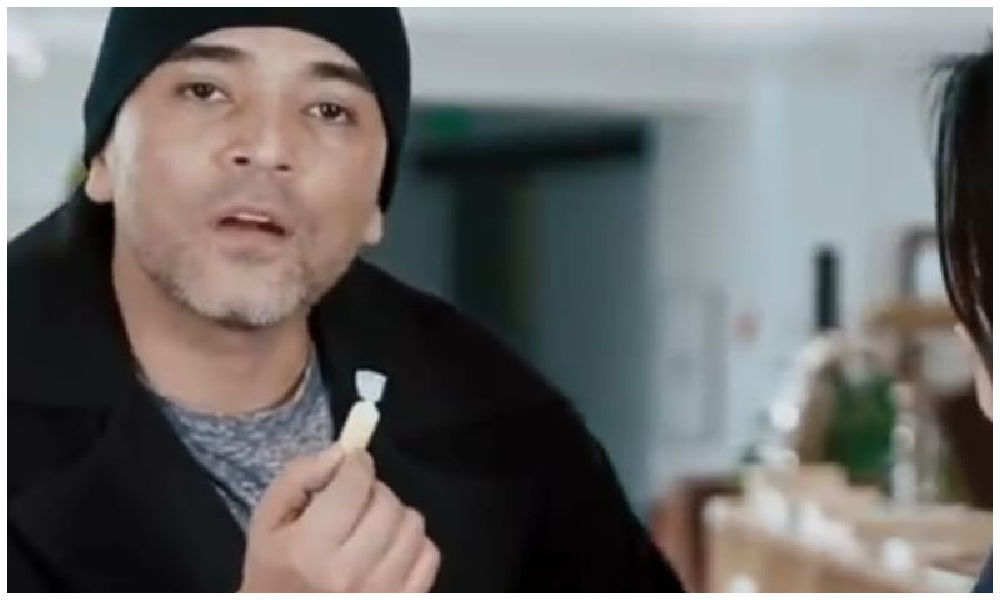
The video then goes on to show the man sitting down on a sofa next to another lady, about to hand her a bottle of pills:
“I also won’t tell you that these little tablets are actually Triazolam, a strong tranquilizer. Taking it can result in quick coma – it’s forty to hundred times stronger than Diazepam [Valium].“
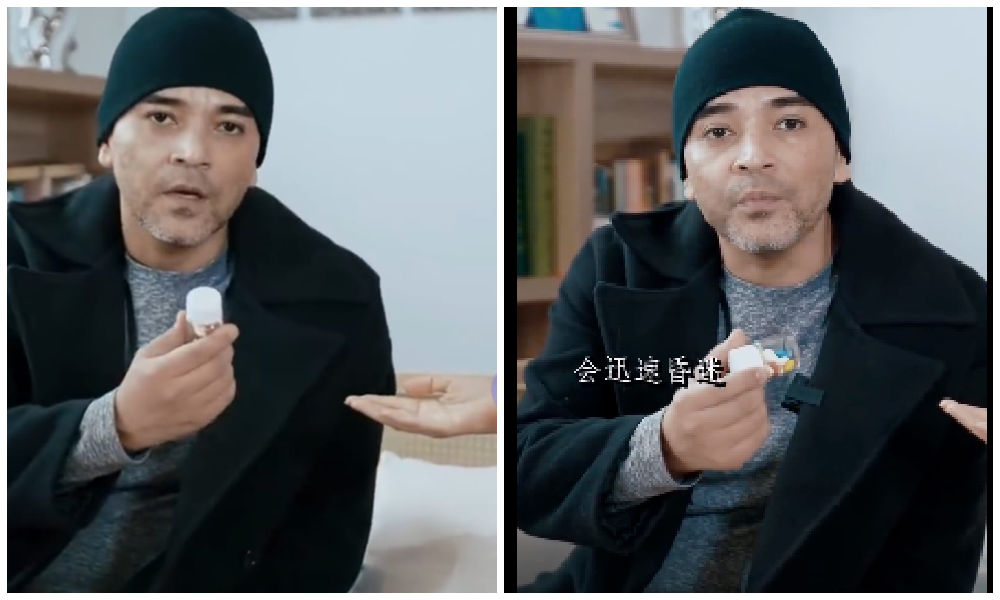
The next scene shows the man stepping up to a woman in what seems to be a book shop or library, and just before handing her a piece of jelly, he turns to the camera and says:
“I also surely will not tell you that I’ve mixed Methcathinone psychoactive substances with jelly. It can lead to violent behavior, and heavy doses can lead to death due to heart failure.“
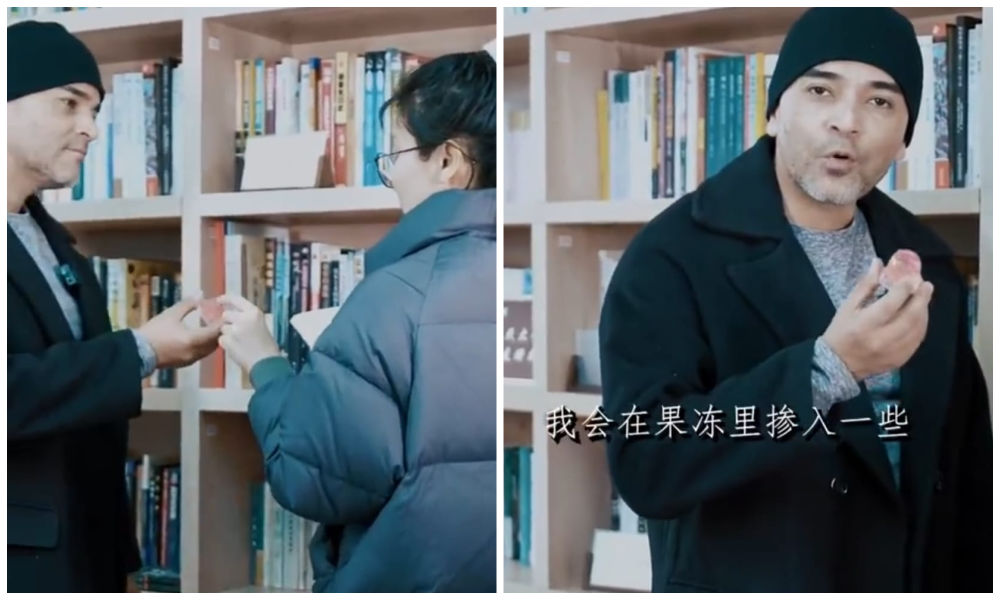
In the final scene, the man is back in the dark room and seems to snort something before turning back to the camera, saying:
“Oh, and don’t send this video to your friends and family. Otherwise, my tactics won’t work..”

“We would almost report him!” some official media accounts wrote about the video.
In recent years, Xinjiang authorities have stepped up their anti-drug publicity campaigns. Besides their social media campaigns, the Xinjiang Anti Drug Office also carries out anti-drug campaigns at schools.

The main actor, who is now a social media hit, appears in multiple videos issued by the Xinjiang authorities (here’s another one).
Some people joke about praising the actor for his acting skills: “I don’t know the difference between the drug lord and the actor anymore.”
“You can only play [the role] this well if you’ve seen a lot of drug dealers,” some commenters suggested.
In light of the actor almost being more popular now than the message the video propagates, many people want to know who he is and what his background is.
“Isn’t he a veteran actor?” some wonder: “What’s his name?”
Although it is not reported at this point who the actor is, some people think he is not a professional but is part of the local anti-drug office team.
It is not uncommon for local anti-drug teams to be creative in their campaigns. In 2020, Hainan’s anti-drug police force published a video of themselves covering Jay Chou’s “Mojito” (link).
Some commenters even suggested that the Xinjiang and Hainan forces join hands in making a new production.
Another campaign that was less popular was one that took place in Guangdong in 2018, when ten households in a local village were publicly shamed by having the words “Drug Crimes in Family” sprayed on their walls or doors (link). Compared to those kinds of publicity campaigns, this Xinjiang one is definitely more popular among Chinese netizens: “He might be a drug lord, but I just think he’s really handsome.”
By Manya Koetse
Get the story behind the hashtag. Subscribe to What’s on Weibo here to receive our newsletter and get access to our latest articles:
Spotted a mistake or want to add something? Please let us know in comments below or email us. First-time commenters, please be patient – we will have to manually approve your comment before it appears.
©2023 Whatsonweibo. All rights reserved. Do not reproduce our content without permission – you can contact us at info@whatsonweibo.com.
Manya is the founder and editor-in-chief of What's on Weibo, offering independent analysis of social trends, online media, and digital culture in China for over a decade. Subscribe to gain access to content, including the Weibo Watch newsletter, which provides deeper insights into the China trends that matter. More about Manya at manyakoetse.com or follow on X.

China Media
12-Year-Old Girl from Shandong Gets Infected with HPV: Viral Case Exposes Failures in Protecting Minors
A doctor in Tai’an faced resistance when she tried to report a 12-year-old girl’s HPV case. She then turned to social media instead.
Published
4 months agoon
December 18, 2024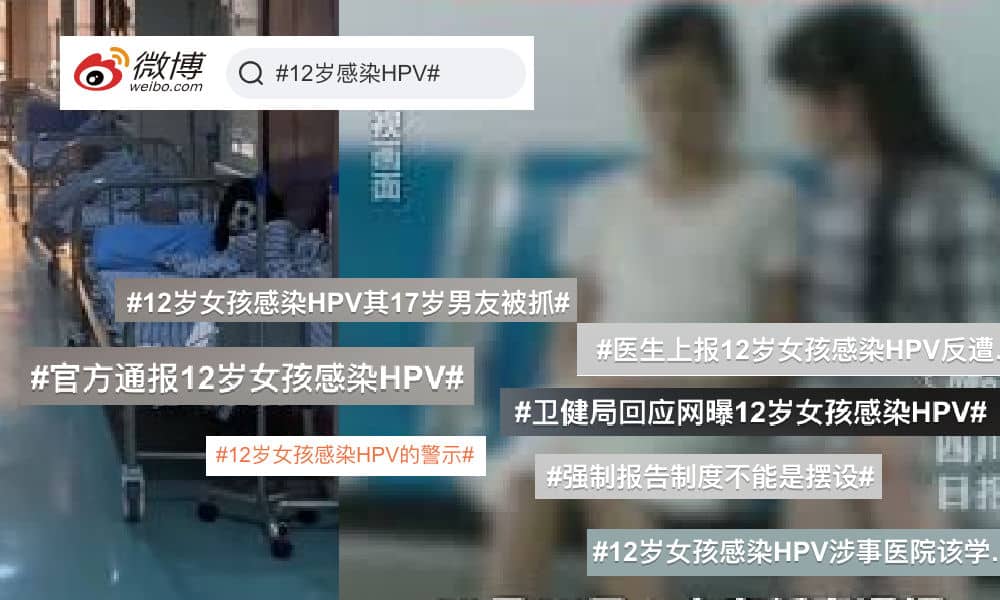
A 12-year-old girl from Shandong was diagnosed with HPV at a local hospital. When a doctor attempted to report the case, she faced resistance. Weibo users are now criticizing how the incident was handled.
Over the past week, there has been significant uproar on Chinese social media regarding how authorities, official channels, and state media in China have handled cases of sexual abuse and rape involving female victims and male perpetrators, often portraying the perpetrators in a way that appears to diminish their culpability.
One earlier case, which we covered here, involved a mentally ill female MA graduate from Shanxi who had been missing for over 13 years. She was eventually found living in the home of a man who had been sexually exploiting her, resulting in at least two children. The initial police report described the situation as the woman being “taken in” or “sheltered” by the man, a phrasing that outraged many netizens for seemingly portraying the man as benevolent, despite his actions potentially constituting rape.
Adding to the outrage, it was later revealed that local authorities and villagers had been aware of the situation for years but failed to intervene or help the woman escape her circumstances.
Currently, another case trending online involves a 12-year-old girl from Tai’an, Shandong, who was admitted to the hospital in Xintai on December 12 after testing positive for HPV.
HPV stands for Human Papillomavirus, a common sexually transmitted infection that can infect both men and women. Over 80% of women experience HPV infection at least once in their lifetime. While most HPV infections clear naturally within two years, some high-risk HPV types can cause serious illness including cancer.
“How can you be sure she was sexually assaulted?”
The 12-year-old girl in question had initially sought treatment for pelvic inflammatory disease, but upon review, her doctor discovered that she had been previously treated for vaginitis six months earlier. During further discussions with the girl, the doctor learned she had been sexually active with a boy five years her senior and was no longer attending school.
Given that the age of consent in China is 14 years old, the doctor sought to report the case to authorities. However, this effort was reportedly met with resistance from the hospital’s medical department, where she was allegedly questioned: “How can you be sure she was sexually assaulted?”
When attempts to escalate the case to the women’s federation and health commission went unanswered, the doctor turned to a blogger she knew (@反射弧超长星人影九) for help in raising awareness.
The blogger shared the story on Weibo but failed to receive a response through private messages from the Tai’an Police. They then contacted a police-affiliated Weibo channel they were familiar with, which eventually succeeded in alerting the Shandong police, prompting the formation of an investigation team.
As a result, on December 16, the 17-year-old boy was arrested and is now facing legal criminal measures.
According to Morning News (@新闻晨报), the boy in question is the 17-year-old Li (李某某), who had been in contact with the girl through the internet since May of 2024 after which they reportedly “developed a romantic relationship” and had “sexual relations.”
Meanwhile, fearing for her job, the doctor reportedly convinced the blogger to delete or privatize the posts. The blogger was also contacted by the hospital, which had somehow obtained the blogger’s phone number, asking for the post to be taken down. Despite this, the case had already gone viral.
The blogger, meanwhile, expressed frustration after the case gained widespread media traction, accusing others of sharing it simply to generate traffic. They argued that once the police had intervened, their goal had been achieved.
But the case goes beyond this specific story alone, and sparked broader criticisms on Chinese social media. Netizens have pointed out systemic failures that did not protect the girl, including the child’s parents, her school, and the hospital’s medical department, all of whom appeared to have ignored or silenced the issue. As WeChat blogging account Xinwenge wrote: “They all tacitly colluded.”
Xinwenge also referenced another case from 2020 involving a minor in Dongguang, Liaoning, who was raped and subsequently underwent an abortion. After the girl’s mother reported the incident to the police, the procuratorate discovered that a hospital outpatient department had performed the abortion but failed to report it as required by law. The procuratorate notified the health bureau, which fined the hospital 20,000 yuan ($2745) and revoked the department’s license.
Didn’t the hospital in Tai’an also violate mandatory reporting requirements? Additionally, why did the school allow a 12-year-old girl to drop out of the compulsory education programme?
“This is not a “boyfriend” or a “romantic relationship.””
The media reporting surrounding this case also triggered anger, as it failed to accurately phrase the incident as involving a raped minor, instead describing it as a girl having ‘sexual relations’ with a much older ‘boyfriend.’
Under Chinese law, engaging in sexual activity with someone under 14, regardless of their perceived willingness, is considered statutory rape. A 12-year-old is legally unable to give consent to sexual activity.
“The [Weibo] hashtag should not be “12-Year-Old Infected with HPV, 17-Year-Old Boyfriend Arrested” (#12岁女孩感染HPV其17岁男友被抓#); it should instead be “17-Year-Old Boy Sexually Assaulted 12-Year-Old, Causing Her to Become Infected” (#17岁男孩性侵12岁女孩致其感染#).”
Another blogger wrote: “First, we had the MA graduate from Shanxi who was forced into marriage and having kids, and it was called “being sheltered.” Now, we have a little girl from Shandong being raped and contracting HPV, and it was called “having a boyfriend.” A twelve-year-old is just a child, a sixth-grader in elementary school, who had been sexually active for over six months. This is not a “boyfriend” or a “romantic relationship.” The proper way to say it is that a 17-year-old male lured and raped a 12-year-old girl, infecting her with HPV.”
By now, the case has garnered widespread attention. The hashtag “12-Year-Old Infected with HPV, 17-Year-Old Boyfriend Arrested” (#12岁女孩感染HPV其17岁男友被抓#) has been viewed over 160 million times on Weibo, while the hashtag “Official Notification on 12-Year-Old Infected with HPV” (#官方通报12岁女孩感染hpv#) has received over 90 million clicks.
Besides the outrage over the individuals and institutions that tried to suppress the story, this incident has also sparked a broader discussion about the lack of adequate and timely sexual education for minors in Chinese schools. Liu Wenli (刘文利), an expert in children’s sexual education, argued on Weibo that both parents and schools play critical roles in teaching children about sex, their bodies, personal boundaries, and the risks of engaging with strangers online.
“Protecting children goes beyond shielding them from HPV infection,” Liu writes. “It means safeguarding them from all forms of harm. Sexual education is an essential part of this process, ensuring every child’s healthy and safe development.”
Many netizens discussing this case have expressed hope that the female doctor who brought the issue to light will not face repercussions or lose her job. They have praised her for exposing the incident and pursuing justice for the girl, alongside the efforts of those on Weibo who helped amplify the story.
The blogger who played a key role in exposing the story recently wrote: “I sure hope the authorities will give an award to the female doctor for reported this case in accordance with the law.” For some, the doctor is nothing short of a hero: “This doctor truly is my role model.”
By Manya Koetse, with contributions by Miranda Barnes
(follow on X, LinkedIn, or Instagram)
Spotted a mistake or want to add something? Please let us know in comments below or email us. First-time commenters, please be patient – we will have to manually approve your comment before it appears.
©2024 Whatsonweibo. All rights reserved. Do not reproduce our content without permission – you can contact us at info@whatsonweibo.com.
China Society
Explaining the Bu Xiaohua Case: How One Woman’s Disappearance Captured Nationwide Attention in China
This is why Bu Xiaohua’s 13-year disappearance became such a major topic of discussion on Chinese social media.
Published
4 months agoon
December 14, 2024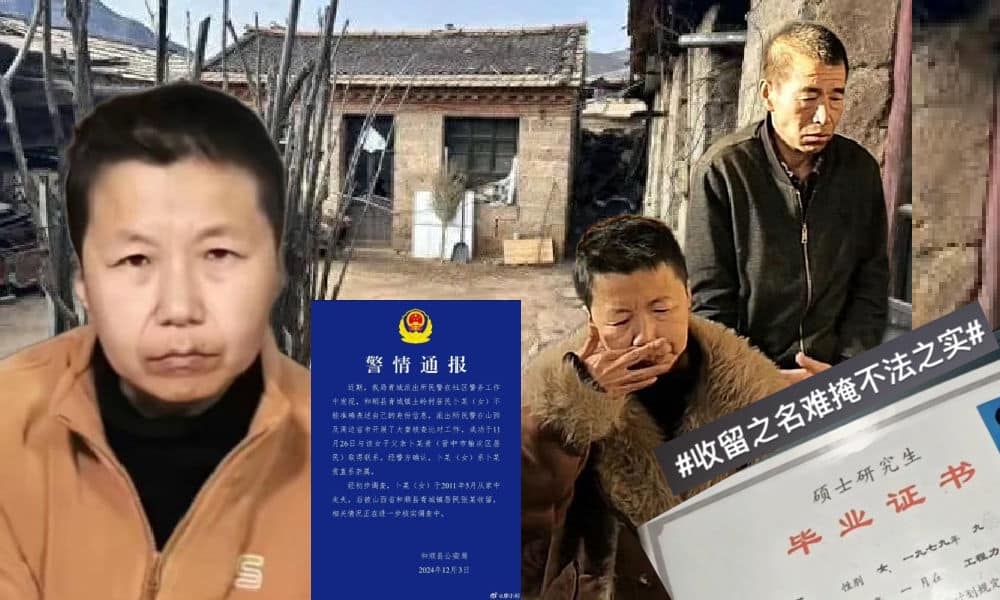
PREMIUM CONTENT
The story of Bu Xiaohua, a Chinese MA graduate who was reunited with her family after disappearing for 13 years, has recently dominated discussions on Weibo. Her case reveals much more than just the mystery of her disappearance—it highlights systemic failures and the vulnerability of women in rural China. Here, we unpack the key aspects of her story.
Her name is Bu Xiaohua (卜小花), but for the past 13.5 years, she lived a life without that name and without any connection to the person she once was.
The story of this Chinese female MA graduate from Shanxi’s Jinzhong, born on September 1, 1979, who disappeared for over a decade and was recently found living in a village just a 2.5-hour drive from her hometown, has sparked widespread discussion on Weibo and beyond. We previously explained the story in our article here.
In brief: On November 25, 2024, a woman from Heshun County (和顺县) sought help from volunteer Zhu Yutang (朱玉堂), who focuses on reuniting families with missing loved ones, to trace the origins of her “aunt,” who had been living with her uncle Zhang Ruijun (张瑞军) for over a decade. During this time, they had multiple children together, despite the woman clearly suffering from mental illness.
As volunteer groups and authorities got involved, it was eventually revealed that the woman was Bu Xiaohua (卜小花), an MA graduate from Jinzhong who had disappeared after experiencing a schizophrenic episode in the spring of 2011. Bu was found looking emaciated, bewildered, and unkempt, and was soon reunited with her family, who immediately ensured she received the help she needed. During a medical check-up, she was found to be not only suffering from mental illness but also from malnourishment.
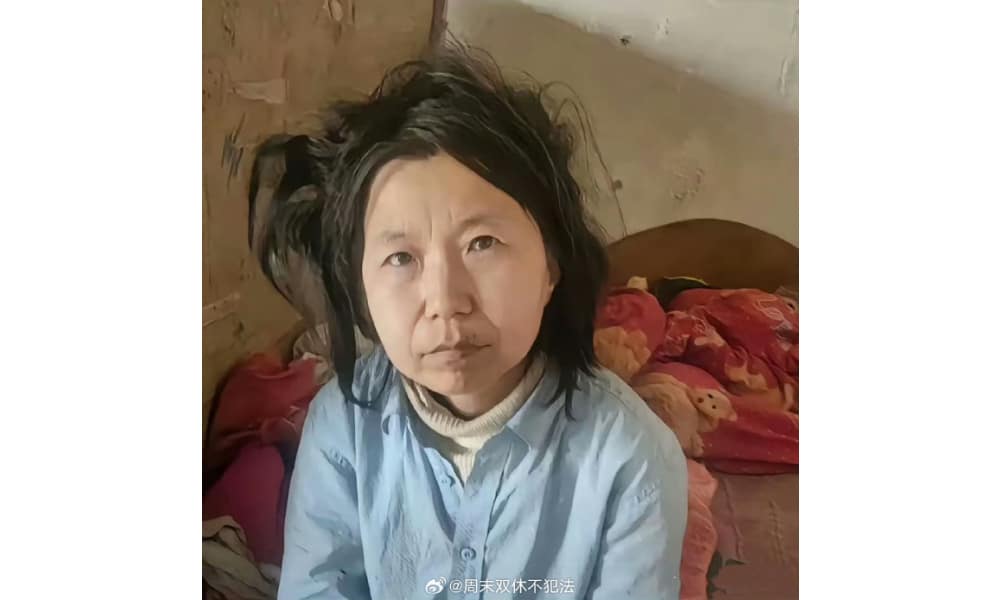
Bu Xiaohua in the Zhang family home.
When volunteers first met with Bu, they tried to get her to speak and learn more about her background. Among other things, she also wrote down several clues that led to the discovery of her identity, such as the names of family members. The first thing she wrote down was “run” (跑).
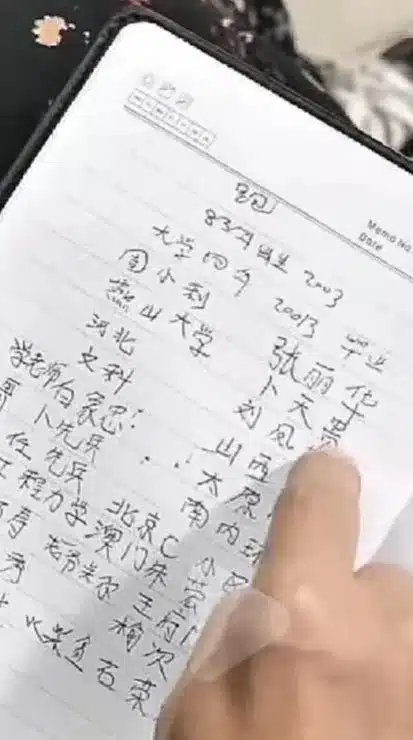
The note by Bu Xiaohua provided many clues about her life prior to being “taken in.”
As discussions about Bu’s disappearance continue, several aspects of this case have become focal points, highlighting the vulnerable position of Bu and many other women like her.
1. “收留”: Was She “Taken In” or Abducted?
One term that frequently comes up in discussions around Bu Xiaohua’s case is “收留” (shōu liú), meaning “to take in” or “give shelter.”
This term was used in various reports about Bu’s story, including in the first police report of December 3.

Police report of December 3, 2024, using the word “taking in.”
Many netizens pointed out that the initial police statement seemed to frame the situation as an act of human compassion, reflecting the niece’s account of how Ms. Bu allegedly “wandered” into their family home one day. The family claims they reported her to the police but eventually decided to “take her in.”
Netizens are outraged by the use of this term, as it glosses over the criminal responsibility of Zhang and his family, who essentially kept Bu Xiaohua away from her own family for over 13 years. They are accused of exploiting her mental illness and inability to consent to marriage or sexual relations, which resulted in multiple children. The exact number is unclear, though rumors suggest she had six children in total, with only two remaining in her care.
The oldest of the two children is already twelve, meaning she must have become pregnant not too long after going missing.
Some commenters have referred to this as “rape-style sheltering” (“强奸型收留”). Was it rape, human trafficking, or illegal detention?
While netizens speculated about the actual crime behind this “taking in” of a mentally ill woman, local police announced they had opened a criminal investigation into suspected illegal acts. Bu’s “husband” has since been detained, and officials are continuing to investigate the case.
No evidence or clues of Bu being trafficked have been found as of now. Investigations into the case reveal that Bu – displaying signs of mental illness according to witnesses – was alone when she walked around neighboring villages for at least ten days in July and August of 2011, some weeks after she disappeared from her home.

Bu and “husband” Zhang at her reunion with family.
The hashtags “Taking In” (#收留#) and “‘Taking In’ Shouldn’t Be Used as a Cover for Unlawful Realities” (#收留之名难掩不法之实#) have been used by netizens to protest the phrase’s use.
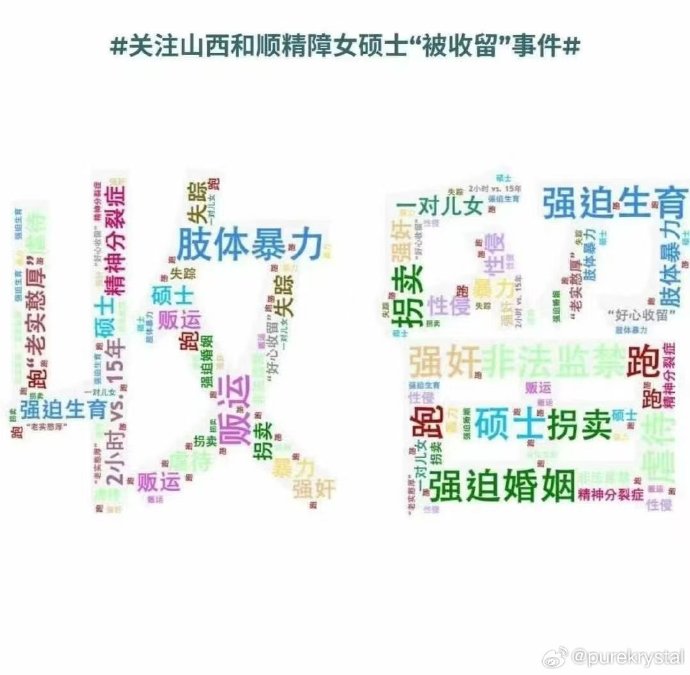
Online image showing all kinds of weords, from ‘human trafficking’ to ‘violence’ to shape the characters for the neutral word of ‘taking in.’
Meanwhile, some reports on the misuse of the term have been censored. The Weibo hashtag “Taking In the Female MA Graduate” (#收留女硕士#) has been taken offline and comes up with a “Sorry, the content of this topic is not displayed” message. A QQ News article titled “Female Master’s Graduate Missing for 13 Years Has Given Birth to a Son and a Daughter; The Person Who ‘Took Her In’ Responds: ‘I Didn’t Detain or Hit Her'” (“女硕士走失13年已生育一儿一女,“收留者”本人回应”) also now leads to a ‘404 page,’ indicating it has been removed.
Critics like Lawyer Zhao (@披荆斩棘赵律师), who has actively commented on this case, believe that Bu’s “husband” and his family never made any real effort to help her find her own family. They speculate that the family only agreed to let volunteers get involved because Bu’s childbearing value had long been exhausted, or because she was aging and they no longer wanted to care for her.
Zhang’s niece, whose request to volunteers initially brought this story to light, has also become an increasingly controversial figure. She recently hosted a livestream in which she claimed that the Zhang family had actually taken good care of Bu, describing her as a “good-for-nothing” who neither did housework nor fed her own children. She also defended her impoverished and disabled unlce Zhang, claiming the family is not as bad as the public says.
“Let her experience being ‘taken in’ by another family and see how she feels,” some top commenters suggested in response.
2. Lacking Law Enforcement: Systematic Failures Exposed
The outrage over the term “taking in” is directly tied to anger over inadequate law enforcement regarding the protection of women in rural China.
Years ago, local police in Heshun County, where Zhang’s family lives, were already aware of a mentally unstable woman being “taken into” a man’s home and giving birth to his children. After all, both children had a hukou (household registration). Chinese media report that police officers visited the home multiple times and allegedly continued efforts to search for her family, which indicates they understood her situation. People wonder how they could let this go on, given Zhang’s continued sexual relations with her—wouldn’t that constitute rape?
Female commenter and author Zheng Yuchuan (@郑渝川) suggested that Bu’s case is particularly troubling because of systematic failure at all levels. She wrote:
“Despite population censuses, pandemic prevention measures like mass nucleic acid testing and vaccinations, as well as the issuance of birth certificates, household registrations, and school admission procedures for the two children—every single step was carried out flawlessly. Isn’t this the biggest joke within the current institutional system?”
Although there are reports emphasizing the continued efforts of the police to find Bu’s family, many netizens aren’t convinced: “Why is it that the police took blood samples and conducted facial recognition comparisons, yet after 13 years, they achieved nothing? Meanwhile, a volunteer, using just a bit of intelligence, managed to make her write down some names, and this bizarre case was solved.”
Law blogger Zhang San (@张三同学) commented: “A single crime pollutes a river; a single act of unjust law enforcement pollutes the entire water source.”
3. A Brilliant Mind: Bu Xiaohua’s Academic Achievements
Another recurring topic is Bu’s academic achievements before her life with the Zhang family. Bu was a student in Yanshan University’s (燕山大学) Mechanics and Engineering program, a prestigious major.
In 2004, she wrote a thesis titled “Temperature Field of a Thin Plate with Curved Cracks During Electrothermal Crack Arrest” (带有曲线裂纹薄板电热止裂时的温度场). Her 2006 thesis was “Small Bending Deformation of an Elastic Thin Plate Under Continuous Transverse Flow-Around Conditions” (不间断横向绕流条件下弹性薄板的小弯曲变形). She obtained her MA degree in 2008.

Bu had planned to continue in academia, but due to an expired ID card, she was unable to register for her Ph.D. exam—a setback that marked the beginning of her rapidly deteriorating mental health. This eventually led to her leaving her home one day in 2011, vanishing without a trace, and ending up in her dire situation with the Zhang family.
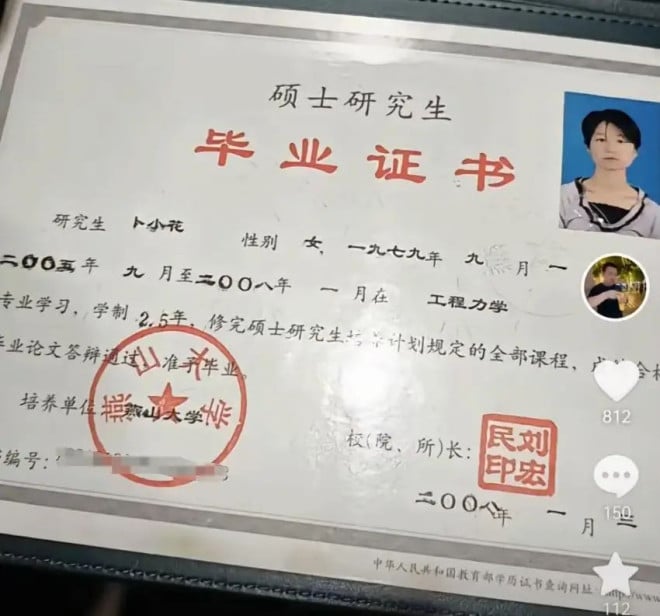
Bu Xiaohua’s diploma
Her education is significant to the story in many ways. First, it serves as an important bridge to her past. One of her former professors, the 82-year-old Bai Xiangzhong (白象忠), was one of the names Bu first wrote on a note when volunteers from the missing persons organization came to her house and asked her about her life.
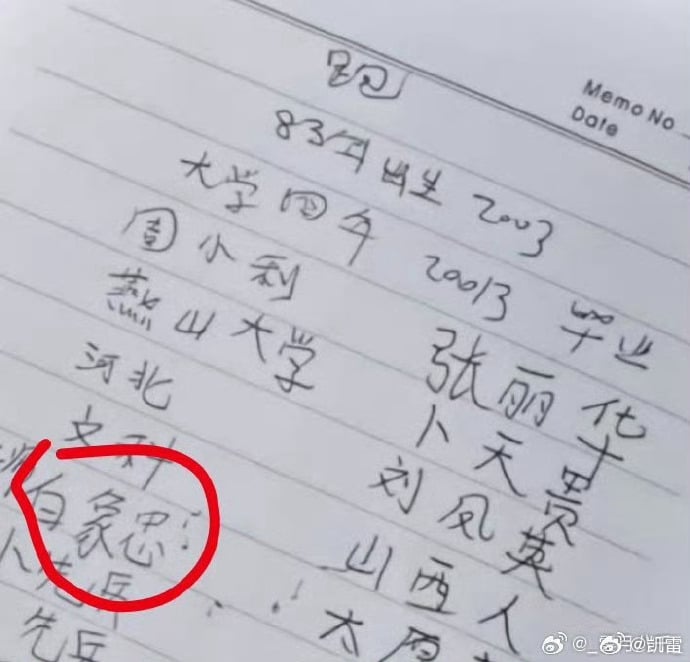
The name of Professor Bai Xiangzhong is one of the names Bu wrote down on a memo in the presence of volunteers trying to learn more about her life.
In recent news, it became known that Bai Xiangzhong learned of Bu’s story and was moved to tears upon hearing about her circumstances.
Bu’s education is also an important part of her identity. Recent videos showed Bu reading a book and pushing back her glasses—which she hadn’t had for 13.5 years—as if it was the most normal thing in the world.
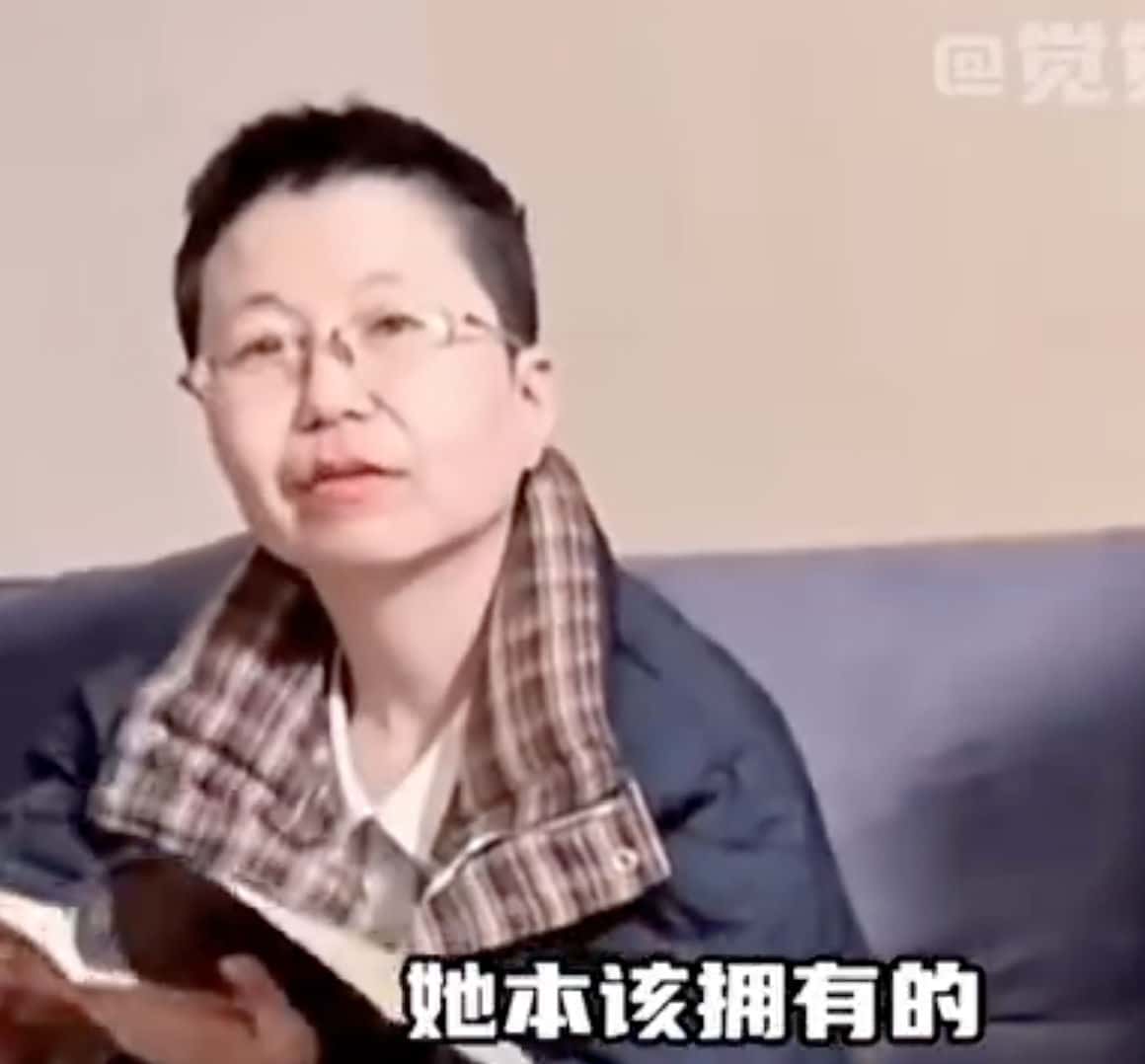
Recent videos showed Bu reading a book and pushing back her glasses—which she hadn’t had for 13.5 years—as if it was the most normal thing in the world.
One popular Weibo blogger (@我不是谦哥儿) wrote:
“More than the Master’s degree she obtained years ago, it’s this natural skill [the way she reads and pushes back her glasses] in which we can directly observe and vividly feel the life she had. We can feel that, if it were not for the dusky farmhouse in the mountainous area where she got trapped, there would have been an entirely different possibility [for her life].”
But her education is also significant in other ways. It shows that it is not just low-income, less-educated, rural women who can become victims of rape and human trafficking, but that even women with a university degree can end up in such situations.
4. Bu Xiaohua’s Case: A Reflection of Larger Social Issues
In the end, the story of Bu Xiaohua is attracting so much attention because she represents much more than just herself.
One of the most well-known stories similar to hers is that of Xiao Huamei (小花梅), the mother of eight children who was found tied to a shed in Xuzhou in 2022. After her story became a major trending topic on Chinese social media, local authorities launched a thorough investigation and uncovered the woman’s true identity. They found that she had been a victim of human trafficking back in 1998.
Like Bu, Xiao Huamei also suffered from mental illness. And similar to Bu’s case, local authorities failed to step in. The family received subsidies, and local officials approved the marriage between the mentally ill woman and her husband, Dong Zhimin, who was later sentenced to prison for his involvement in the human trafficking case.
This all brings back associations with the Chinese film Blind Mountain (盲山, 2007). Directed by Li Yang (李杨), the movie revolves around Bai Xuemei (白雪梅), a recent college graduate who is tricked into traveling to a remote mountain village under the pretense of securing a job. Once there, she is drugged, kidnapped, and sold into a forced marriage with a rural farmer. Trapped in the isolated and impoverished village, she faces constant physical and psychological abuse from her “husband,” his family, and even the local community, who see her captivity as normal or necessary. Despite multiple attempts to escape, she is repeatedly caught and encounters indifference or complicity from those around her, including the police. She is only rescued years later.
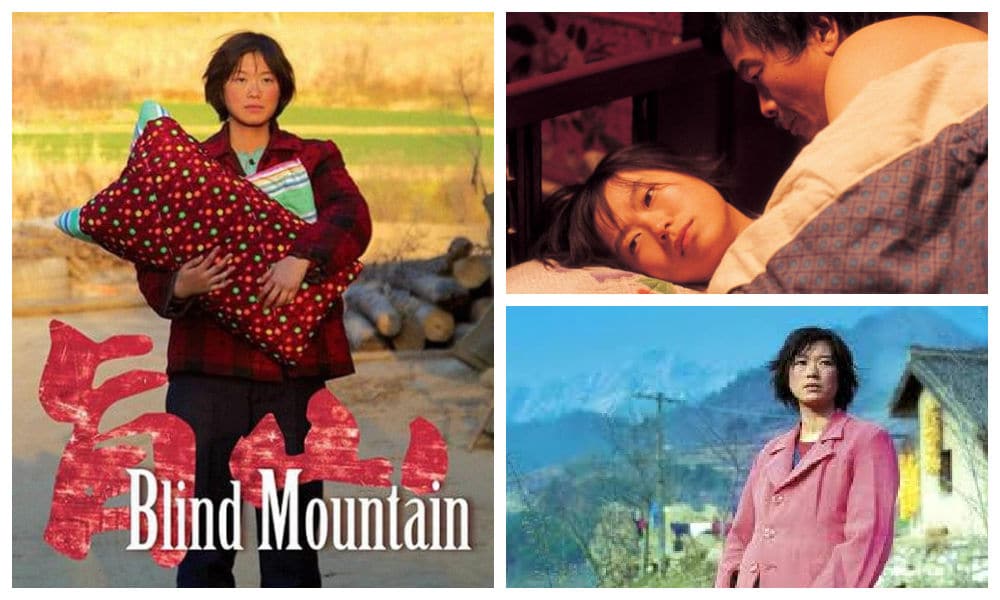
From Blind Mountain (2007).
Films such as Blind Mountain and the 2022 case of Xiao Huamei have helped create more awareness of the vulnerable position of Chinese women in rural areas, particularly those dealing with mental or physical disabilities. Last year, a marriage in Henan was denied after a local official found the woman, who was deaf and mute, had not learned sign language and could not write (read more).
But the problem persists. China, particularly its rural villages, faces a shortage of women stemming from the decades-long one-child policy and a traditional preference for boys. This has been further exacerbated by women migrating out of villages in search of better prospects. As a result, many rural single men are unable to marry, especially when they face additional challenges such as poverty or disability. Since marriage and children are considered social norms, these men and their families are often willing to take drastic measures. This situation has fueled the human trafficking of women for forced marriage in China since the 1980s.
“Why not re-release Blind Mountain?” some wonder. “It feels so relevant today.”

As for Bu, she is currently doing well given the circumstances. Her brother, who searched for her for so many years, is determined to take care of his sister. “My little sister is the treasure of our entire family,” he recently said. “Every day that I am on this earth is a day that I will take care of her.”
By Manya Koetse
(follow on X, LinkedIn, or Instagram)
Spotted a mistake or want to add something? Please let us know in comments below or email us. First-time commenters, please be patient – we will have to manually approve your comment before it appears.
©2024 Whatsonweibo. All rights reserved. Do not reproduce our content without permission – you can contact us at info@whatsonweibo.com.
Subscribe
China Trending Week 15/16: Maozi & Meigui Fallout

China Reacts: 3 Trending Hashtags Shaping the Tariff War Narrative

No Quiet Qingming: From High-Tech Tomb-Sweeping to IShowSpeed & the Seven China Streams

From Trade Crisis to Patriotic Push: Chinese Online Reactions to Trump’s Tariffs

China Trending Week 14: Gucci Fake Lipstick, Xiaomi SU7 Crash, Yoon’s Impeachment

“Dear Li Hua”: The TikTok/Xiaohongshu Honeymoon Explained

Beyond the Box Office: What’s Behind Ne Zha 2’s Success?

Weibo Watch: A New Chapter

15 Years of Weibo: The Evolution of China’s Social Media Giant

Tuning Into the Year of the Snake

IShowSpeed in China: Streaming China’s Stories Well

TikTok Refugees, Xiaohongshu, and the Letters from Li Hua

The ‘China-chic Girl’ Image and the Realities of China’s Competitive Food Delivery Market

US-Russia Rapprochement and “Saint Zelensky”: Chinese Online Reactions to Trump’s Shake-Up

“Black Myth: Wukong”: From Gaming Screens to the CMG Spring Festival Gala?
Get in touch
Would you like to become a contributor, or do you have any tips or suggestions? Get in touch here!
Popular Reads
-

 China Insight11 months ago
China Insight11 months agoThe Tragic Story of “Fat Cat”: How a Chinese Gamer’s Suicide Went Viral
-

 China Digital10 months ago
China Digital10 months agoChina’s 2024 Gaokao Triggers Online Discussions on AI
-

 China Arts & Entertainment11 months ago
China Arts & Entertainment11 months agoSinging Competition or Patriotic Fight? Hunan TV’s ‘Singer 2024’ Stirs Nationalistic Sentiments
-

 China Arts & Entertainment12 months ago
China Arts & Entertainment12 months ago“Old Bull Eating Young Grass”: 86-Year-Old Chinese Painter Fan Zeng Marries 36-Year-Old Xu Meng





